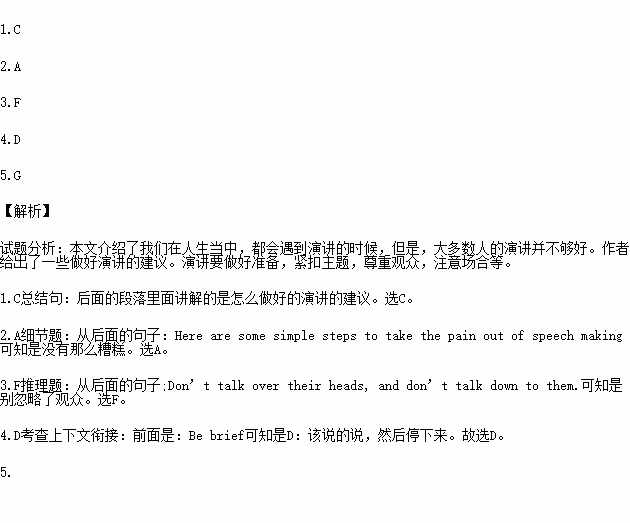题目内容
根据短文内容,从短文后的选项中选出能填入空白处的最佳选项。选项中有两项为多余选项。
We are all called upon to make a speech at some point in life, but most of us don’t do a very good job. 1.
So, you have to give a speech and you are terrified. You get nervous, you forget what you want to say, you stumble over words, you talk too long, and you bore your audience. Later you think, “Thank Goodness, it’s over. I’m just not good at public speaking. I hope I never have to do that again.”
Cheer up! 2. Here are some simple steps to take the pain out of speech making. Ask yourself the purpose of your speech. What is the occasion? Why are you speaking? Then, gather as many facts as you can on your subject. Spend plenty of your time doing your research. Then spend plenty of your time organizing your material so that your speech is clear and easy to follow. Use as many examples as possible, and use pictures, charts, and graphs if they help you make your points more clearly. 3. Don’t talk over their heads, and don’t talk down to them. Treat your audience with respect. They will appreciate your thoughtfulness.
Just remember: Be prepared. Know your subject, your audience, and the occasion. Be brief. 4. And be yourself. Let your personality come through so that you make person-to-person contact with your audience.
If you follow these simple steps, you will see that you don’t have to be afraid of public speaking. In fact, you may find the experience so enjoyable that you volunteer to make more speeches! You’re not convinced yet? 5.
A. It doesn’t have to be that bad.
B. Take several deep breaths before your speech.
C. This article gives some advice on how to give a good speech.
D. Say what you have to say and then stop.
E. Don’t say what you aren’t familiar with.
F. Never forget your audience.
G. Give it a try and see what happens.
 优生乐园系列答案
优生乐园系列答案 新编小学单元自测题系列答案
新编小学单元自测题系列答案写作
假如你是李华,你的外国朋友Jack想了解著名科学家屠呦呦的相关情况, 请你根据以下的要求给他写一封回信。
姓名 | 屠呦呦 |
国籍 | 中国 |
职业 | 药学家,科学家 |
兴趣爱好 | 自幼对传统中药兴趣浓厚 |
主要经历 | 1. 1930年12月30日生于浙江宁波; 2. 1951年考入北京大学,主修制药专业; 3. 毕业后接受中医培训两年半,并一直在北京从事中医工作; 4. 1972年成功发现并制成青蒿素; 5. 2015年10月5日,她被授予诺贝尔医学奖,成为中国第一个获得诺贝尔奖的女性科学家。 |
注意: 1. 词数100左右;
2. 可以适当增加细节,以使行文连贯;
3. 参考词汇:
药学家chemist 青蒿素Qinghaosu 诺贝尔医学奖 Nobel Prize in Medicine
4.信的开头和结尾已经为你写好。
Dear Jack, I am glad to hear that you would like to know something about the famous scientist Tu Youyou. Now, I will give you a brief introduction to her. Wish you all the best ! Yours, Li Hua |

